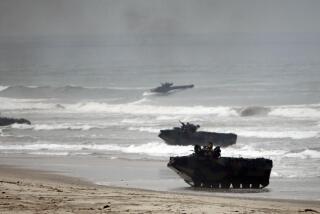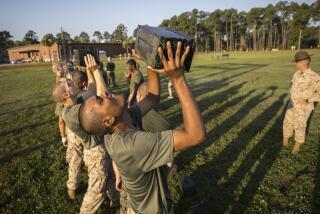Psychiatrists Try to Ease Marines’ Load in Somalia : Military: Troops are being prepared for the sight of suffering and limits of their mission, which is <i> not </i> to feed the hungry themselves.
- Share via
Psychiatrists are playing a key role in the Pentagon’s humanitarian assistance to Somalia, preparing U.S. troops for the trauma of seeing starving masses and helping them cope with the helplessness that they will feel because they are not there to feed the hungry.
At Camp Pendleton, where the majority of U.S. troops assigned to Somalia are based, worried Marine officers are using Navy psychiatrists to remind troops that, for the moment, their mission is limited to protecting shipments of food bound for starving villagers.
Military officials said the initial reaction of Marines to the suffering and misery in Somalia has led to an almost urgent need to provide psychological briefings for the troops waiting to be shipped to the East African nation.
“We’re not officially going into combat. The task is to prepare people for the reality outside of normal combat. There is no enemy in Somalia, except for starvation and misery,” said Navy Cmdr. Michael Johanek, psychiatrist for the 1st Marine Division.
“In combat, dehumanizing the enemy makes it easier to kill him and lessen the guilt. But, in this case, we can’t dehumanize starvation. This failure to dehumanize the enemy takes away one of our natural defenses.”
Johanek and another Navy psychiatrist are counseling groups of up to 500 Marines at a time at a base auditorium. They use videos of starving Somalians to show them the extent of the suffering and to explain that U.S. troops are there to provide security, not to personally distribute food.
In fact, the MRE rations issued to the troops would harm a seriously malnourished person.
Johanek, 47, a Berkeley native, said the military brass is concerned that young troops might be psychologically scarred because they are helpless to relieve the suffering that surrounds them.
Johanek was a division psychiatrist in the Persian Gulf War. He expects to depart for Somalia any day to counsel troops. He was a combat medical corpsman in Vietnam before going to medical school and becoming an officer. During the week, he has been advising Army psychiatrists, who are also counseling troops going to Somalia.
The military’s mission in Somalia is much more demanding for mental health professionals than preparing troops for actual combat, Johanek said. The military interventions in Kuwait, Panama and Grenada, where U.S. troops were able to confront the enemy directly, were easy by comparison, he added.
“We’re emphasizing that our mission is security, not handing out food,” Johanek said. “Our mission is to provide protection so that food and medical supplies can be given to the people as soon as possible.”
He said Marines are being prepared “emotionally and psychologically” for their limited mission because “they will not be allowed to offer hands-on help” to hungry Somalians. Marines are being told that feeding the starving is the responsibility of international relief agencies.
In fact, the military’s mission is so narrow that U.S. troops are prohibited from sharing their MRE rations with local Somalians. Medical experts said eating the calorie-rich rations could kill a person who has been slowly starving to death.
The prohibition against sharing rations with the Somalians is contrary to the natural impulse of the troops to feed the starving. Lt. Paul Hammer, a psychiatrist at the Navy Hospital at Camp Pendleton, said this could be agonizing to the Marines.
“You’re going to have these overwhelming scenes of suffering; being unable to help these people and be generous is sure to have an emotional impact on the troops,” Hammer said. “ . . . We’re telling these young Marines that is a normal reaction to an abnormal situation, and it’s OK to feel that way. If you didn’t have an emotional reaction, that would be abnormal.”
The Pentagon has not put a deadline on the U.S. mission to Somalia. Hammer said a lengthy deployment can have both a good and bad effect on American troops.
“The longer the operation goes on, the more difficult it will be for the troops, living in a country without any infrastructure and where sickness and disease could be fatal,” he said. “But, on the other hand, the longer the operation goes on, you’ll be able to see the positive results of the mission. You’ll see something good happening to Somalia and its people. You’ll get a satisfying feeling from accomplishing something good.”
More to Read
Sign up for Essential California
The most important California stories and recommendations in your inbox every morning.
You may occasionally receive promotional content from the Los Angeles Times.













